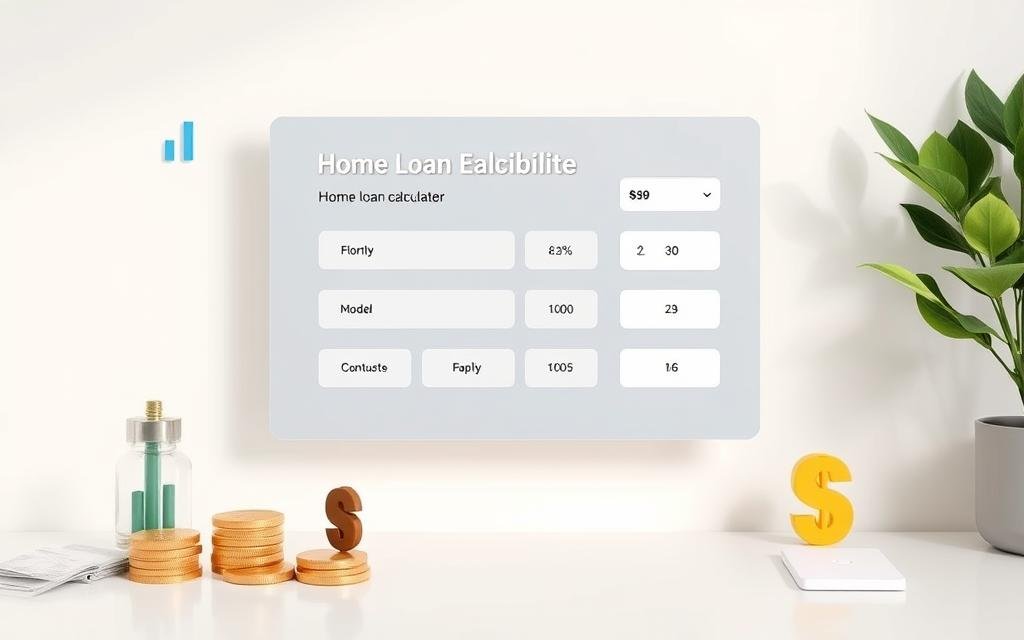
Finding your dream home can seem overwhelming. But it doesn’t have to be. Imagine sitting on your porch, watching the sun set, and feeling content. That’s what we aim to help you achieve.
I started looking for my dream home by chance. I was browsing listings when I found a charming bungalow near me. As soon as I entered, I knew it was the one. It would be the perfect place for the next chapter of my life.
This guide will help you find your dream home. We’ll cover everything from checking if you can buy to finding the right neighborhood. You’ll learn about different homes and get tips to make your search easier. Our goal is to help you find a home that meets your needs and dreams.
Determine Your Eligibility and Financing Options
Starting your home buying journey can feel overwhelming. But knowing your eligibility and financing options is key. Let’s look at the various loan programs and how an eligibility calculator can help you understand your qualifications.
Learn About Loan Programs and Income Limits
There are many home loan options, like FHA, VA, and conventional mortgages. Each has its own income needs and rules. For instance, FHA loans need a 580 credit score and a 3.5% down payment. They’re great for first-time buyers.
VA loans, however, are for military folks and their spouses. They don’t need a down payment. It’s vital to know these details to pick the right loan for you.
Use an Eligibility Calculator
An online home loan eligibility calculator is super helpful. It takes your income, debt, and credit into account. It shows how much you might borrow, the interest rate, and monthly payments. This helps you see what you can afford and focus your search.
Also, talking to local housing agencies is smart. They can guide you through mortgage programs and income requirements in your area. They offer valuable advice to find the best loan for your home loan eligibility.

Get Pre-Qualified with a Preferred Loan Officer
Starting your journey to homeownership means taking a big step. You need to find a trusted mortgage loan officer. They will help you understand your loan options and how much you can afford.
At Integrity Home Mortgage Corporation, we focus on you. Our loan officer, Alex Jaffe, has over 16 years of experience. He has closed over 2,500 loans and is among the top 200 nationwide.
Alex is an expert in more than just home loans. He specializes in condos and co-ops, helping about 30% of his clients. His hard work earned him the Key to the City in 2013 and the Legends Award in 2023.
Working with Alex and his team is easy. They will help you through the pre-qualification process. You’ll understand your eligibility and the loan amount you can get.
We offer many financing options to fit your needs. Whether you’re buying your first home or upgrading, we have what you need. We also provide tools like payment calculators to help you plan your finances.
Choosing Alex Jaffe means getting expert advice and personal service. Start your journey to your dream home by getting pre-qualified today.
| Statistic | Value |
|---|---|
| Loans Closed by Alex Jaffe | Over 2,500 since 2007 |
| Ranking of Alex Jaffe Among Loan Officers Nationwide | Top 200 since 2015 |
| Ranking of Alex Jaffe Among Loan Officers in DC | Top 10 by business volume |
| Percentage of Alex Jaffe’s Business Related to Condos or Co-ops | Approximately 30% |
| Awards Received by Alex Jaffe | Key to the City (2013), Legends Award (2023) |
| Integrity Home Mortgage Corporation Established | 2005 |

«Working with a local mortgage lender can offer personalized service and other advantages not readily available through larger national lenders.«
Attend a Homebuyer Education Course
As a first-time homebuyer, taking a homebuyer education course is key. These courses, both online and in-person, teach you about the duties and value of homeownership. They are needed for many loans, like those from CalHFA.
Options for Online and In-Person Courses
Groups like eHome and NeighborWorks America have many homebuyer education options. Online courses, like HomeTRACK Online, cost $100 per household and can be done at your own speed. For a hands-on experience, in-person classes like the Homebuyers course from Housing & Education Alliance are available. They meet over three evenings.
These courses cover a lot, including budgeting, credit, mortgage choices, and home upkeep. In-person classes are a full-day with a workbook. Online courses are self-paced and should be finished in a month.
Homebuyer education is a smart investment in your future. It helps you understand the homebuying process and make smart choices. This will lead to a successful and fulfilling homeownership journey.
Homebuyer education is more than just a loan requirement. It’s a crucial step to becoming a knowledgeable and responsible homeowner. Look into your options and choose the course that fits your learning style and needs.
Begin Your Home Search
After getting pre-qualified and educated, it’s time to start your home search. A local real estate agent can be very helpful. They guide you and find local listings that fit what you’re looking for.
Your agent knows the local market well. They share insights on recent sales, current listings, and trends. This helps you make smart choices.
Work with a Local Real Estate Agent
Working with a local real estate agent has many benefits:
- They give you the latest local listings and market data.
- They help with the offer and negotiation process.
- They know the best neighborhoods, schools, and other important factors.
- They help with all the steps in buying a home.
With a skilled local real estate agent, your home search will be easier. You’ll have a better chance of finding the right home for you.
| Key Benefits of Working with a Local Real Estate Agent |
|---|
|
«A good local real estate agent can be the key to unlocking your dream home. They’ll provide the insights and support you need to navigate the home search process with confidence.«
Defining Your Dream Home Budget
Starting your home buying journey means setting a realistic budget for your dream home. You need to figure out your monthly housing costs. This includes your mortgage, property taxes, homeowners insurance, and private mortgage insurance (PMI).
Let’s look at what shapes your home buying budget:
- Median Sales Price: The median sales price for a new home in the second quarter of 2024 was $412,300.
- Debt-to-Income Ratio: Lenders want your debt-to-income ratio to be 43% or less. This means your monthly debt should not be more than 43% of your income.
- Private Mortgage Insurance (PMI): If you put down less than 20%, you’ll likely need to pay PMI. This can add 0.5% to 1% to your monthly payment.
- Closing Costs: Closing costs can be 3% to 6% of the home’s price. Make sure to include these in your budget.
Now, let’s calculate your monthly housing payments:
- Figure out your down payment. A 20% down payment is common, but you can also get loans with lower down payments, like 3.5% for FHA loans.
- Calculate your loan amount by subtracting your down payment from the home’s price.
- Find your monthly mortgage payment. Use the loan amount, interest rate, and loan term to do this.
- Add property taxes, homeowners insurance, and PMI (if needed) to your monthly mortgage payment.
- Check your other monthly expenses. Make sure your total housing costs fit within your budget.
By thinking about these points, you’re on the right track to setting a realistic budget for your dream home. Next, we’ll talk about saving for your down payment and closing costs.
Save for Your Dream Home Down Payment
When you buy a home, the down payment is key. Saving more upfront helps you in the long run. Try to save at least 20% to avoid extra insurance costs and get better rates.
But saving 20% can be tough, especially for first-timers. Luckily, there are down payment help programs. They can boost your savings and make buying a home easier.
Explore Down Payment Assistance Options
Many places offer down payment help. This includes grants, low-interest loans, and matching funds. When looking at these programs, consider:
- Minimum credit score requirements (often as low as 620 for TSAHC programs)
- Household income limits and home price restrictions
- Repayment terms, such as a 3-year period before the loan must be repaid if the home is sold or refinanced
- Potential additional savings, like an extra $500 for Texas Heroes when using a Mortgage Credit Certificate (MCC) and Down Payment Assistance together
First-time buyers and some professions like teachers and police officers might qualify for special help.
Start Saving Early and Strategically
Even without assistance, start saving early. Small, regular savings can grow fast. Set up automatic transfers to make saving easier.
| Down Payment Amount | Impact on Mortgage Cost |
|---|---|
| 6% (Average for First-Time Buyers) | Higher monthly payments, Private Mortgage Insurance (PMI) required |
| 16% (Average for Repeat Buyers) | Lower monthly payments, no PMI required |
| 20% | Best interest rates, no PMI required |
Focus on your home buying down payment and check out all saving for a house and down payment assistance options. This will help you reach your dream of owning a home.
Get Pre-Approved for a Mortgage
If you’re looking for a new home, getting pre-approved for a mortgage is key. You’ll send your financial info to a lender. They’ll check your credit and give you a pre-approval letter. This letter makes you a stronger buyer when you start looking for homes.
The mortgage pre-approval process includes a few steps:
- Gather your financial documents, like W-2s, pay stubs, tax returns, and bank statements.
- Fill out a mortgage application with your income, assets, and credit history details.
- Get a credit check, which might lower your score temporarily.
- Get a pre-approval letter from the lender showing how much you can borrow.
Industry data shows that mortgage pre-approval speeds up the loan approval process. Also, lenders on Zillow have good ratings and offer competitive rates. This lets buyers compare different lenders.
| Prequalification | Preapproval |
|---|---|
| Provides an estimate of the loan amount you may qualify for | Involves a more thorough review of your financial information and results in a pre-approval letter |
| Can be done quickly online, with results expected within an hour | Typically takes more time, with the final pre-approval letter issued within 10 business days |
| Requires basic income and financial information | Requires more detailed documentation, such as pay stubs, tax returns, and bank statements |
By getting pre-approved for a mortgage, you can search for homes with confidence. You’ll know your budget. This also helps you stand out when making offers, as sellers prefer pre-approved buyers.
Homes for Sale Near Me: Finding the Perfect Neighborhood
Finding your dream home means looking at more than just the house. The ideal neighborhood is key. Look at both the facts and what feels right to you when searching for the perfect place.
Evaluate Objective and Subjective Factors
Start with the facts: safety, school quality, and cost. These community factors are important. But also think about the little things like noise, amenities, and the community feel.
Try out different neighborhoods to really understand what you want. This way, you’ll know what’s most important to you and your family.
| Objective Factors | Subjective Factors |
|---|---|
|
|
By looking at both the facts and your feelings, you’ll find the perfect neighborhood. It will match your home location dreams and fit your community factors.
Determine Your Ideal Property Type
When you start looking for a home, think about the property types that fit your needs. Your dream home could be a single-family house, a cozy townhouse, or a spacious condominium. You might even want a fixer-upper with lots of potential.
Consider the number of bedrooms and bathrooms, stairs, lot size, and special features like a pool. Talking to a real estate agent about your housing preferences can help you find the right property type for you.
Condominiums or townhouses are great for those who want less work. Single-family homes offer privacy and the chance to customize. Fixer-uppers let you add your personal touch but need more time and effort.
Research the property types in your area. Weigh the good and bad of each. Knowing what you want in a home will help you find the perfect one.
«Buying a home is one of the most important decisions you’ll ever make. Take the time to explore your options and find the property type that truly speaks to you.«
Create a List of Must-Have Features
Starting our home buying journey means making a detailed list of our dream home features. This list will guide our search and help us make smart decisions when we’re ready to offer on a home.
Our list might include things like the number of bedrooms and bathrooms. We might also want specific features like a fireplace or a big backyard. Or, we might have a preference for certain architectural styles. It’s key to prioritize this list, as it will help us through the tough choices we’ll face.
By carefully thinking about our «home buying wish list,» we can find a home that really fits our needs. This focus on detail will help us create a space that perfectly matches our lifestyle and personal taste.
